ALGIERS // Ahmed Ben Bella, Algeria's first president and a historic leader of its bloody independence struggle from France, died at his family home in Algiers on Wednesday. He was 95.
Family members and the Algerian state news agency did not give the cause of death, but twice in the last month Ben Bella had been treated at the military hospital of Ain Naadja for discomfort. Sheikh Khalifa bin Zayed, the President of the UAE, sent a condolence cable to the Algerian President, Abdulaziz Bouteflicka, according to Wam, the Emirates news agency.
The charismatic Ben Bella, a symbol of pan-Arabist ideology as well as the global anti-colonial movement, was president of Algeria from 1963 until he was overthrown in a military coup in 1965 by the army chief of staff, Col Houari Boumedienne.
Ben Bella was under house arrest until 1980, and he went into self exile in Switzerland until returning to the country in 1990 as part of the opposition to the ruling political party he helped found.
A giant of Algeria's independence struggle, he played only a symbolic role in the latter years of his life, heading the opposition Movement for the Democracy in Algeria Party, which competed in the aborted 1991 elections, winning just 2 per cent of the vote.
His party was banned in 1997, but he continued to live in Algeria, often condemning government policies. He was present when the current president, Abdelaziz Bouteflika, was sworn in for his third term in April 2009.
Two years earlier, Ben Bella became head of the African Union's "Group of Elders".
Aside from Mr Bouteflika, Ben Bella was the country's sole civilian leader and was followed by a string of generals.
One of the six "historic leaders" of Algeria's revolt against French colonial rule, Ben Bella spent 23 years of his life in French and Algerian prisons.
Through most of the eight-year war of independence, Ben Bella was held in a French fortress. His liberation was one of the main Algerian demands in the drawn-out peace talks that led to the 1962 Evian agreements for Algeria's independence.
Elected president of the newly independent nation virtually without opposition, he enjoyed less than three years of an extravagant and erratic leadership before being overthrown in an army coup and imprisoned by Col Boumedienne, then army chief of staff.
Until Boumedienne's death 13 years later, Ben Bella became a "non person" in Algeria. No public mention of his name was allowed in Algerian media - all state-controlled. Even the official attacks on Ben Bella's allegedly "arbitrary and wasteful" regime avoided mentioning his name.
Boumedienne died in 1978. His pragmatic and moderate successor, Chadli Bendjedid, freed Ben Bella from more than a decade of detention without trial, ultimately allowing him to go abroad with his wife Zora and their two adopted daughters.
It was Ben Bella's misfortune that he was very much a product of the colonial regime that France imposed on Algeria for 130 years. He spoke better French than Arabic, and the Arabic he spoke was colloquial rather than literary. As a result, he had difficulty conversing with the leaders of other Arab nations.
Ben Bella was born on December 25, 1916, to a peasant family in Marnia, on Algeria's border with Morocco. He joined the French army in his late teens, rising to the rank of senior warrant officer.
He fought with distinction with the Free French Forces in Italy during the Second World War and won five French decorations including the prestigious Military Medal. But returning home following the allied victory in Europe, he quickly found that a war hero of Muslim origin had little future in an Algeria ruled by French settlers.
His application for enrolment as rural policeman was rejected, while his widowed mother was denied a licence to open a tobacco store in Marnia. Disillusioned, Ben Bella turned against France and was elected municipal councillor for the anti-colonialist "Movement for the Triumph of Democratic Liberties".
When the movement was declared illegal, Ben Bella went underground. In April 1949, he organized a raid on the Oran central post officer to finance his revolutionary activities. The raid brought him nationwide attention and Robin-Hood-like popularity among the Muslim masses.
After independence was won, Ben Bella staked much of his prestige as president on a summit conference of Asian and African countries at which he was to be host and chairman. On June 19, 1965, three days before the summit was to open, the army seized power in an almost bloodless coup. Boumedienne was proclaimed president but the summit never took place.





